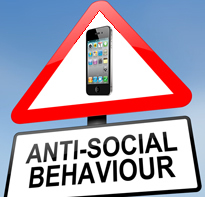Social networks such as Facebook, Twitter have completely changed the way some people discuss and interact with their family, friends, the friends of their friends and all the people they are likely to encounter. Indeed, people communicate more frequently, at any time and from anywhere in all manner of ways including the exchanging of pictures, videos and instant messages
If this is the case do these new ways of ‘communicating’ differ from the old? Do we speak the same language when having the person in front of us we would on-line? Do we have the same attitude toward a debate on internet and in real life ? Do we enjoy an event or a discussion the same way ? Is it possible that we could be getting more and more captivated by technology, to the extent that we become unintentionally unsociable?
Indeed, it is well known that people have their smartphone on them and hardly ever forget to take it with them. We often check if we have our smartphone before we check for keys, or wallet or anything else. Ironically being on the phone with someone in public as we are, more and more often, has the effect of disconnecting ourselves from the real world and from the  people around us, something disconcerting in the street and extremely dangerous on the road!
people around us, something disconcerting in the street and extremely dangerous on the road!
So our behaviour is changing. Have you ever decided not to go out with your friends and stay at home in front of your computer talking on social media sites ? Have ever sent a Tweet, texted, or updated your Facebook status while being out with friends or family ? A number of observers have commented on the dependence people have on social networks and FOMA, the fear of missing out; constantly posting and checking in on social networks sites in case something is happening that they do not know about. Are we turning into a reclusive community which finds itself more comfortable and preferable to talk via the Cloud rather than spend quality time with these people, face-to-face.
New means of communication remove geographical boundaries and distance allowing us to be connected with people globally. It is always good to know what our friends or our family in other countries are doing on their holidays, the places they are visiting, but are we using the technology solely for this purpose ? Or do we use it to talk to the friend who lives down the street rather than going out and meet the person and interact with them. Some may ask, “Why is this a problem ?”, but this might mean that in the future we will all just talk via computers or smartphones and not have any face-to-face interactions.
Lack of confidence

A couple of recent studies have found that using a cell phone can have an effect on your subsequent behaviour. A study conducted by the Robert H. Smith School of Business at the University of Maryland found that ‘after a short period of cell phone use, people were less likely to partake in “prosocial” behavior — actions that are intended to help another person or society — compared with a control group.’ While another carried out by the University of Michigan found that ‘that people who talk on cell phones frequently are less likely to communicate in public.’ Of course the situation is more complicated than that. Both studies comment on the contradictory nature of cell phone user behaviour, being both connected and disconnected at the same time. In any case it is not entirely the fault of the phone as the study says “The technology itself is not good or bad, – It is how it’s used and who it’s used with.”
More information here:
- http://socialmediatoday.com/node/1102921
- A debate on the subject can be found at http://www.debate.org/opinions/has-social-media-made-us-less-social
